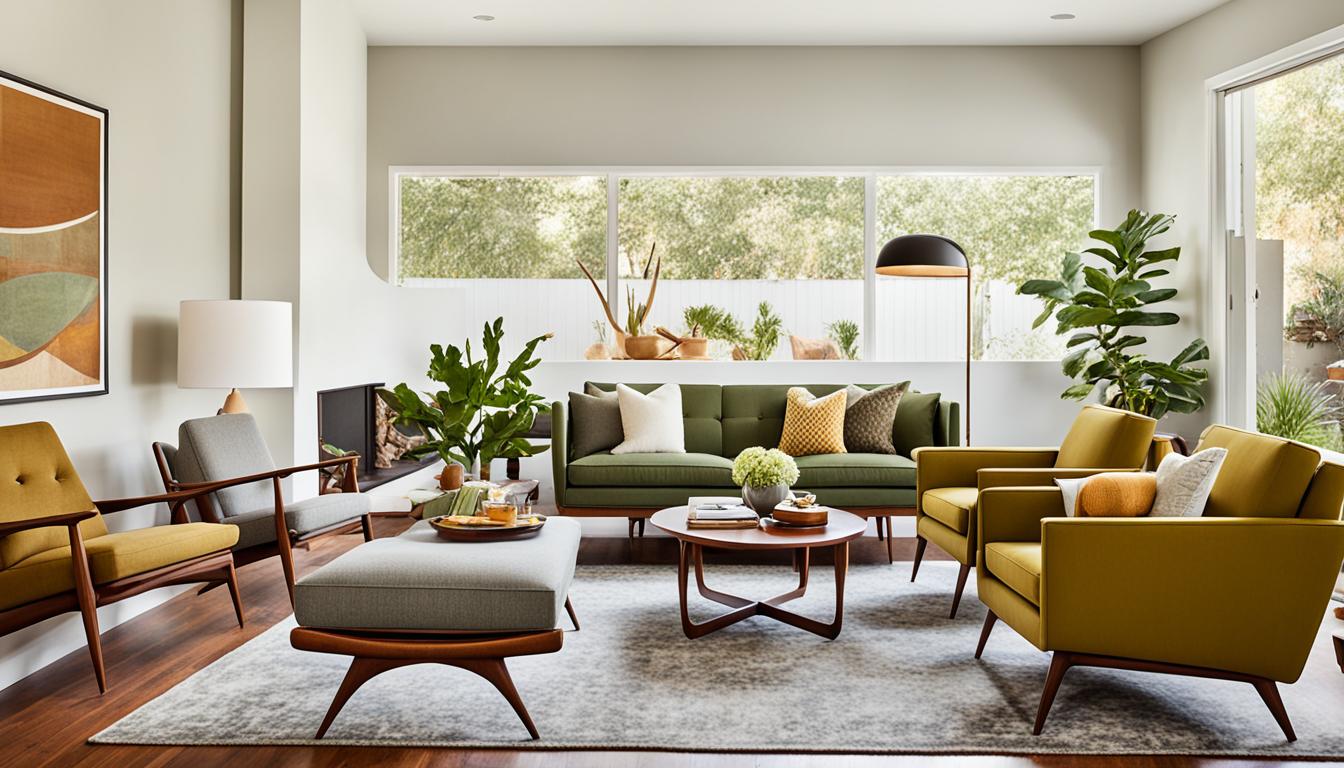Want to update your space with a timeless look? Adding mid-century modern style to your home is a great choice. It combines retro charm with modern style. This design trend is known for its clean lines, functional furniture, and a touch of nostalgia.
We’ll show you how to pick the right furniture and colors for that mid-century look. You’ll learn about sleek shapes, organic designs, and bold patterns. Get ready to make your home a stylish retreat inspired by a famous design trend of the 20th century.
Key Takeaways
- Embrace clean lines and organic shapes in furniture
- Focus on functionality and minimalism
- Mix natural and man-made materials
- Use bold, earthy color palettes
- Incorporate iconic mid-century modern furniture pieces
- Add statement lighting fixtures
- Bring the outdoors in with plants and natural elements
Understanding Mid-century Modern Design: A Brief History
Mid-century modern style started in the mid-20th century. It caught the world’s eye with its sleek lines and new designs. This style began in the 1940s and lasted until the late 1960s. It left a big mark on architecture, furniture, and interior design.
This style came from a need for functionality and simplicity after World War II. Designers aimed to make pieces that looked good and worked well. They used new materials and ways of making things. This led to the creation of vintage furniture that people still want today.
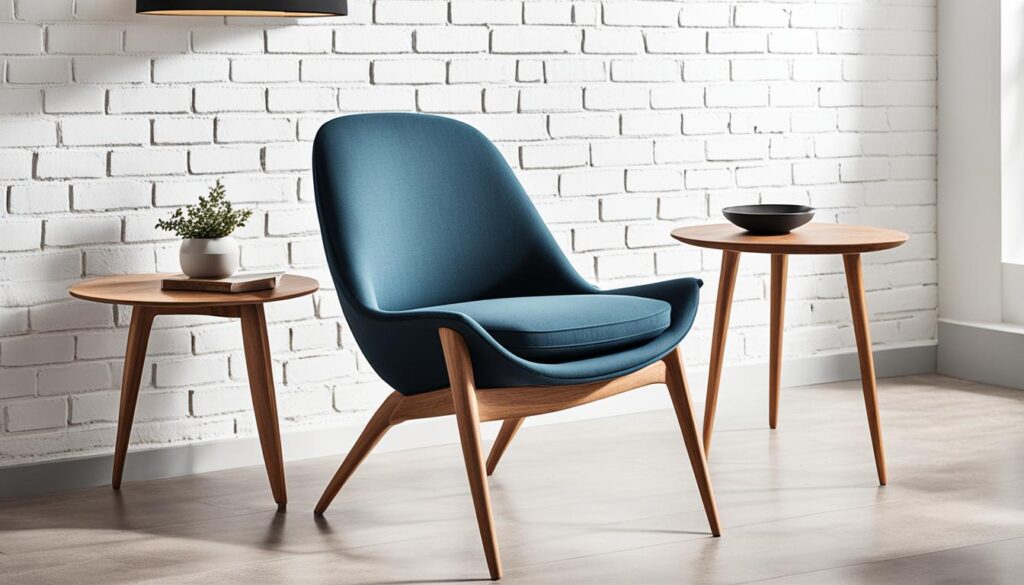
Charles and Ray Eames were key figures in mid-century modern design. They made famous chairs that showed how form and function could come together. Eero Saarinen and George Nelson also played big roles in shaping this style.
“Good design is a matter of discipline. It starts by looking at the problem and collecting all the available information about it. If you understand the problem, you have the solution.” – Charles Eames
The style took inspiration from the Bauhaus movement and Scandinavian design. It focused on clean lines, organic shapes, and using natural and man-made materials. This mix led to furniture and decor that seemed both timeless and ahead of its time.
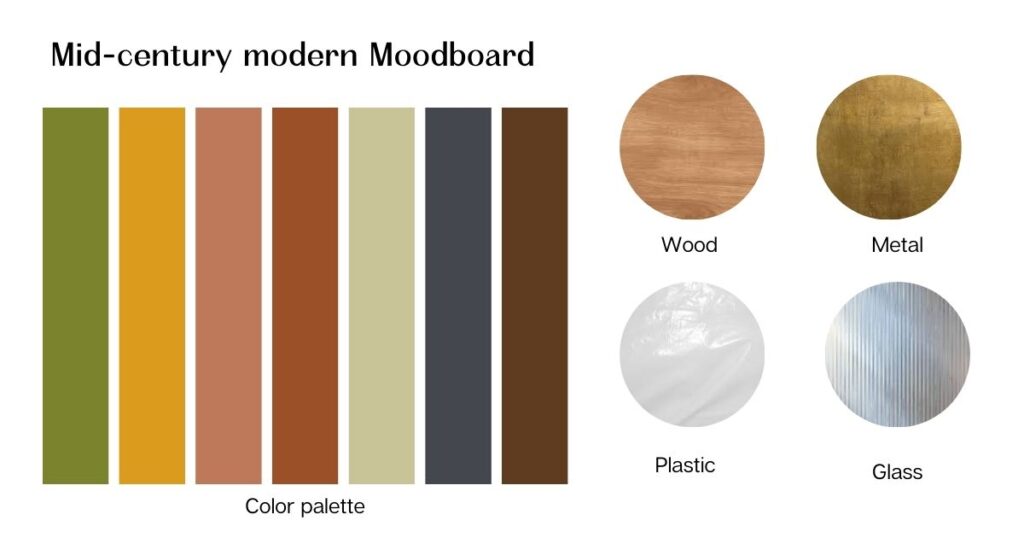
Today, mid-century modern style still affects modern design. Its lasting popularity shows its timeless appeal and how it fits in with today’s interiors.
Key Elements of Mid-century Modern Style
Mid-century modern design is timeless. It mixes beauty with practicality. Let’s look at what makes this style stand out.
Clean Lines and Organic Shapes
Mid-century modern loves simplicity. Furniture has smooth lines and curves like nature. These shapes make your space feel welcoming and calm.
Functionality and Minimalism
Minimalism is key in mid-century modern. Each piece has a purpose, reducing clutter. This makes spaces feel calm and tidy.
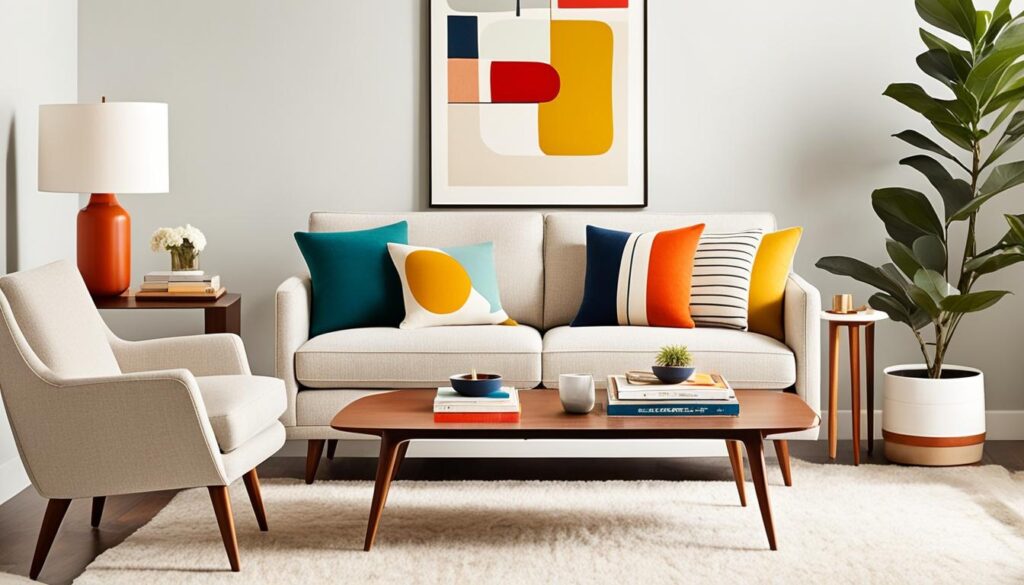
Integration of Natural and Man-made Materials
This style combines natural and synthetic materials. Wood, leather, and stone meet plastic, glass, and metal. This mix adds texture and interest to your home.
Bold, Earthy Color Palettes
Colors are important in mid-century modern. Warm browns, soft greens, and deep oranges are common. These colors, with neutral tones, create a welcoming space.
“Mid-century modern is not a style, it’s a language in the design world.”
Using these elements, you can make a mid-century modern space that’s both stylish and useful. This design’s beauty comes from its simplicity and nature connection.
How to Create a Mid-century Modern Style in Your Home
Ready to make your space look like a Mid-century Modern haven? Let’s dive into some practical tips. The first step is to plan your space well to get that perfect mid-century modern look.
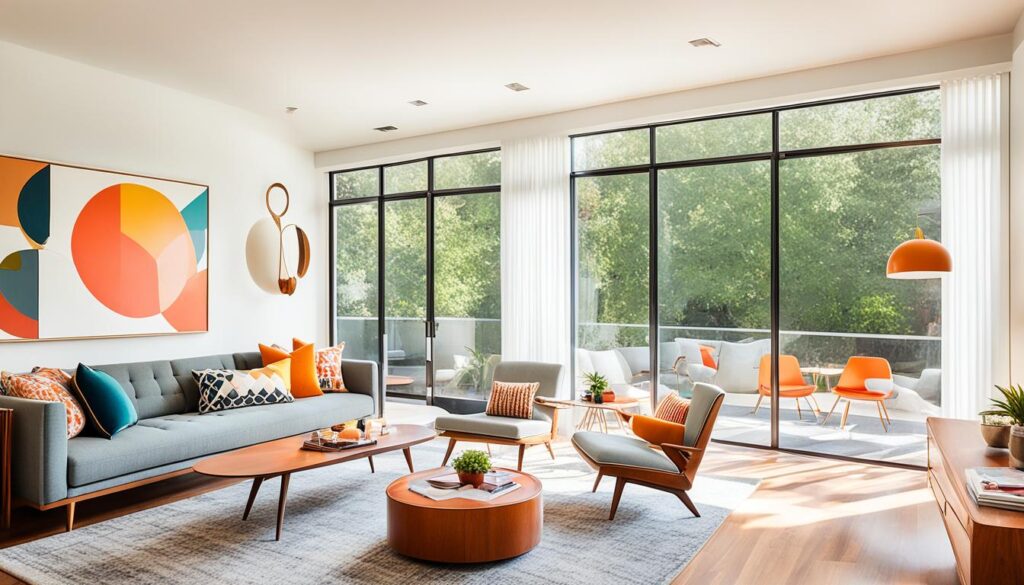
Begin by decluttering your area. Mid-century modern design loves clean lines and open spaces. Remove any furniture or decor you don’t need to make the space feel airy. Then, pick out key pieces that capture the era’s style.
- Choose furniture with tapered legs and organic shapes
- Opt for low-profile sofas and chairs
- Incorporate wood elements, especially teak or walnut
- Add a statement lighting fixture, like a Sputnik chandelier
Color is key in mid-century modern design. Go for bold, earthy tones like mustard yellow, avocado green, and rusty orange. Use these colors on accent walls, throw pillows, or artwork.
Bring the outdoors in. Big windows, indoor plants, and natural materials like stone or wood are must-haves. Adding a sleek, minimalist fireplace can also be a great focal point.
“The details are not the details. They make the design.” – Charles Eames
To keep up with interior design trends, mix vintage with modern pieces. This mix creates a space that’s both unique and up-to-date, honoring mid-century style.
Incorporating Vintage Furniture Pieces
Vintage furniture brings character and authenticity to mid-century modern interiors. It can elevate your space and tell a unique design story.
Iconic Mid-century Modern Designers to Know
Get to know famous designers who shaped mid-century modern style:
- Charles and Ray Eames: Known for their iconic chairs
- Arne Jacobsen: Creator of the Egg Chair
- George Nelson: Famous for his Marshmallow Sofa
- Eero Saarinen: Designer of the Tulip Table
Where to Find Authentic and Reproduction Pieces
Look for vintage furniture at these places:
- Antique shops and flea markets
- Online marketplaces like 1stDibs and Chairish
- Estate sales and auctions
- Specialty mid-century modern retailers
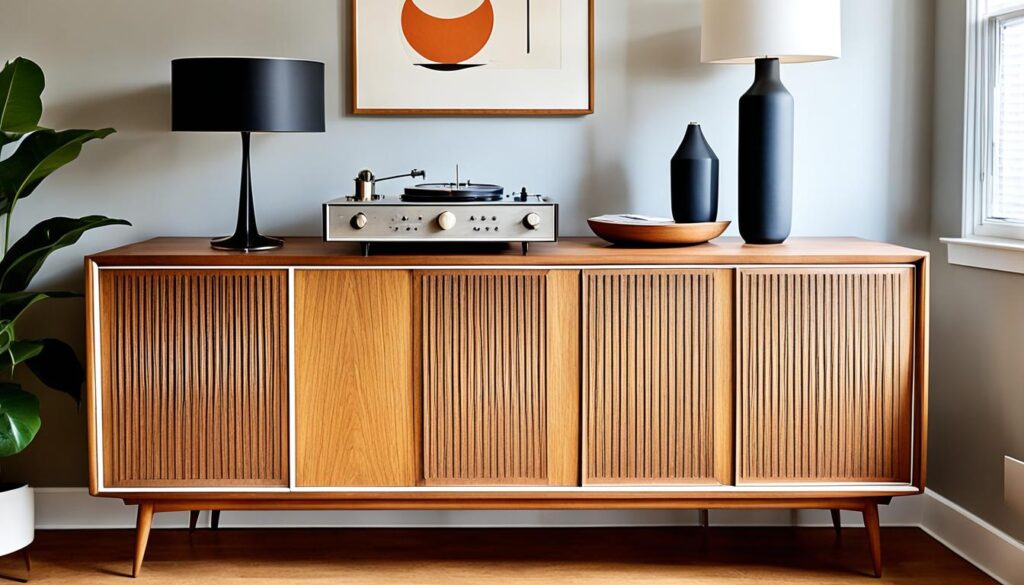
Mixing Vintage and Modern Furniture
Combine old and new for a fresh mid-century style:
- Pair a vintage sideboard with contemporary dining chairs
- Use a classic Eames lounge chair alongside a modern sofa
- Combine a retro coffee table with current accent pieces
By mixing vintage furniture with modern trends, you can make a timeless mid-century modern space. It will be uniquely yours.
| Vintage Piece | Modern Counterpart | Styling Tip |
|---|---|---|
| Eames Lounge Chair | Minimalist Sofa | Add textured throw pillows for contrast |
| Saarinen Tulip Table | Contemporary Dining Chairs | Use a bold, modern centerpiece |
| Nelson Bubble Lamp | LED Floor Lamp | Layer lighting for a cozy atmosphere |
Embracing Geometric Patterns and Textures
Mid-century modern style loves bold geometric patterns and rich textures. These add visual interest to minimalist decor, making spaces dynamic yet balanced. Let’s see how to add these design elements to your home.
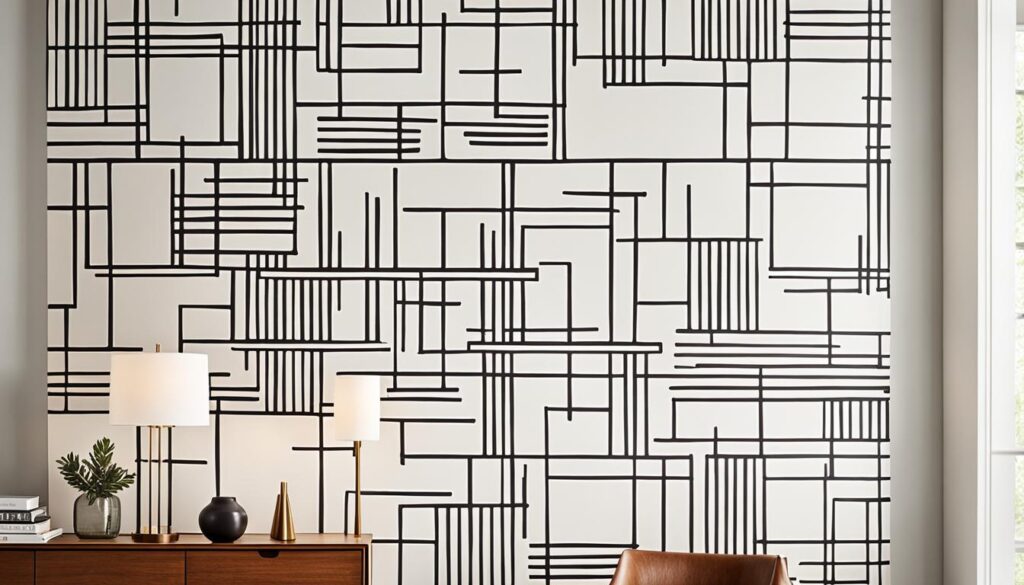
Wallpaper is great for adding geometric patterns. Choose designs with shapes like diamonds, hexagons, or abstract patterns. For a softer look, pick textured wallpapers that look like grasscloth or linen.
Textiles are also great for patterns and textures. Find throw pillows, rugs, or curtains with bold geometric prints. Mixing different pattern scales adds depth and interest to your room.
- Use chevron patterns on area rugs
- Add diamond-patterned throw pillows to solid-colored sofas
- Hang curtains with abstract geometric designs
Don’t overlook accessories! Use geometric shapes in decorative items like vases, bookends, or wall art. These small touches can greatly enhance your mid-century modern space.
Here are some iconic Mid-century accessories
“Geometric patterns bring energy and movement to minimalist decor, creating a perfect balance between simplicity and visual excitement.”
It’s important to find a balance. Too many patterns can overwhelm, while too few might make a space feel flat. Try different combinations until you find the right mix for your home.
Lighting: The Crown Jewel of Mid-century Modern Decor
Lighting is key in Mid-century Modern interiors. It’s not just for light; it shapes the space’s feel. The right lighting turns your home into a Mid-century gem.
Statement Pendant Lights
Statement lighting is a must in Mid-century design. Pendant lights with unique shapes and materials stand out. Look for designs with geometric or organic shapes in brass, glass, or wood.
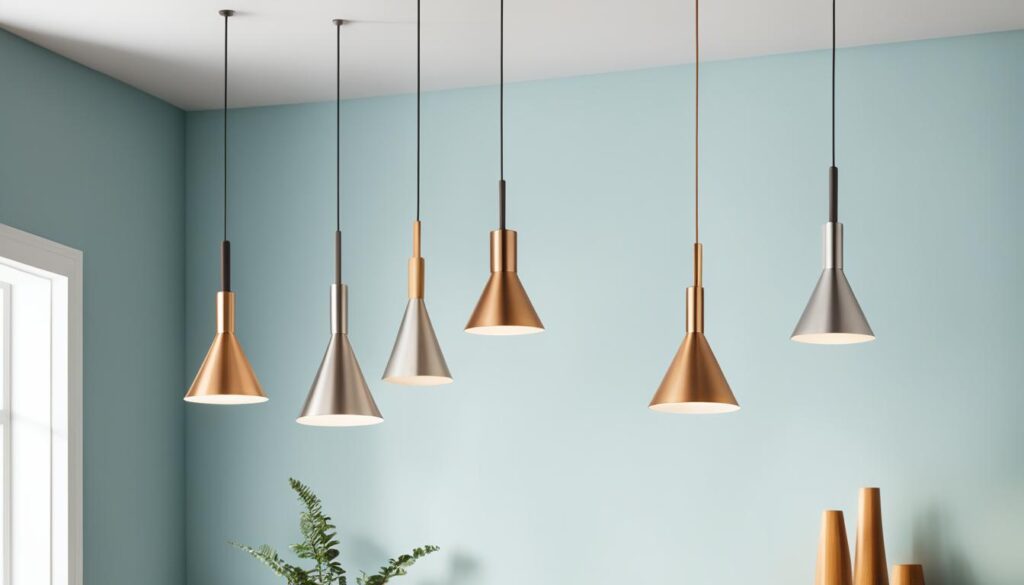
Some of my favorites :
- Sputnik gold chandelier
- Globe gold chandelier
- Colorful modern pendant
- Green glass chandelier
- Dark green glass pendant
- Golden globe pendant set
- Contemporary globe chandelier
- Modern golden globe pendant set
Sculptural Floor Lamps
Floor lamps in Mid-century Modern style are like art. They have long arms or tripod bases. These lamps offer both light and visual interest, great for reading or dark spots.
Some of my favorite pieces :
Wall Sconces and Table Lamps
Wall sconces and table lamps add depth to your space. Choose pieces with clean lines and interesting textures. Many Mid-century lamps have colorful shades or unique bases, adding color to your decor.
Some of my favorite pieces:
- Globe glass brass wall sconce
- Modern organic shape wall sconce
- Sage green wall sconce
- Wood and linen table lamp
- Glass Orange Table Lamp
- Glass green table lamp
- Sculpure table lamp
- Brass table lamp
| Lighting Type | Characteristics | Popular Materials |
|---|---|---|
| Pendant Lights | Geometric or organic shapes | Brass, glass, wood |
| Floor Lamps | Arching or tripod designs | Metal, wood, fabric shades |
| Wall Sconces | Clean lines, interesting textures | Metal, glass, ceramic |
| Table Lamps | Unique bases, colorful shades | Ceramic, glass, metal |
Adding these lighting elements makes your space both useful and stylish. Lighting is a key trend in home decor. It can greatly impact your space.
Creating an Open and Airy Space: Floor Plans and Room Layout
Open floor plans are key in Mid-century Modern design. By removing walls, you get that airy feel everyone loves. First, look at your home’s layout and see where you can take down walls that don’t carry weight.
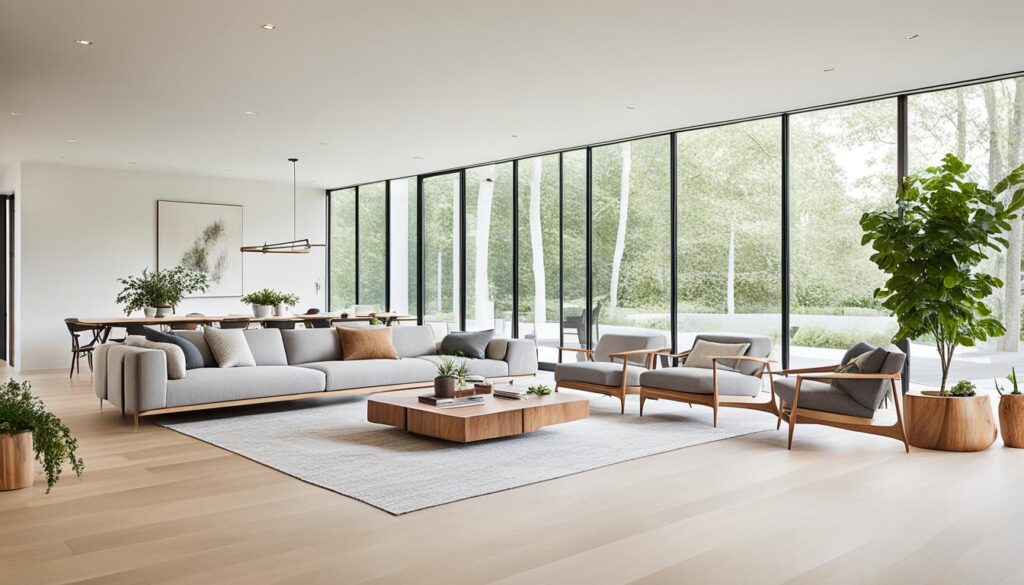
To let in more light, swap solid doors for glass ones or add bigger windows. This makes your space brighter and connects it to the outdoors, a big idea in Mid-century Modern style.
When picking furniture, go for a minimalist look. Choose items that do more than one job and don’t fill up the room. For instance, a sofa with storage keeps things tidy.
“Less is more when it comes to Mid-century Modern design. Embrace open spaces and let your carefully curated pieces shine.”
Room dividers can mark off areas without losing the open vibe. Think about using:
The aim is to make your home flow well. With these tips, you’ll get the Mid-century Modern look and a space that’s both useful and welcoming.
Bringing the Outdoors In: Indoor Plants and Natural Elements
Mid-century modern design loves the link between indoor and outdoor areas. Adding indoor plants and organic materials makes your home lively and nature-inspired.
Popular Mid-century Modern Plant Species
Some plants are perfect for mid-century style. Think about these for your space:
Planters and Plant Stands
Style your indoor plants with mid-century inspired planters and stands. Choose items with clean lines and organic shapes. Look for materials like ceramic, wood, or metal. Elevated stands can make your space look more interesting.
Incorporating Natural Wood and Stone
Add warmth and texture to your mid-century modern home with organic materials. Use wood paneling or stone accents. Natural wood furniture pieces also work well. These elements mix nature and design beautifully.
| Organic Material | Application | Benefits |
|---|---|---|
| Teak Wood | Furniture, Wall Panels | Durability, Warm Tones |
| Marble | Countertops, Tabletops | Elegance, Unique Patterns |
| Cork | Flooring, Wall Tiles | Eco-friendly, Sound Absorption |
By adding indoor plants and organic materials, you can make your mid-century modern space feel fresh and connected to nature.
Accessorizing Your Mid-century Modern Space
Make your mid-century modern space pop by picking accessories that match its clean lines and organic shapes. It’s all about finding the right mix of minimalist decor and vintage furniture. This mix adds character to your home.
For wall art, go for abstract or geometric prints that match the era’s style. Choose pieces with bold colors or simple black-and-white designs. This adds visual interest without making the space feel too busy.
Decorative objects are key in mid-century modern design. Think about adding:
- Sculptural vases in organic shapes
- Starburst wall clocks
- Retro-inspired barware
- Vintage globes or maps
To keep things tidy, stick to the “less is more” rule. Show off a few standout pieces instead of filling up your space with lots of small items. This way, you follow the minimalist decor idea and let each piece stand out.
When picking vintage furniture, make sure it’s useful and looks good. A sleek sideboard can be both storage and a spot to show off your accessories.
“In mid-century modern design, every object should earn its place through both form and function.”
Don’t forget to switch up your accessories with the seasons. This keeps your space fresh and interesting. It lets you highlight different parts of your collection while keeping the mid-century modern look timeless.
Conclusion
Creating a mid-century modern style in your home is an exciting journey. You’ve learned about clean lines, organic shapes, and bold colors. These elements define this timeless aesthetic. By blending vintage furniture with modern pieces, you can make a space that’s both nostalgic and fresh.
Lighting is key in mid-century design. Statement pendant lights, sculptural floor lamps, and unique wall sconces can change your rooms. Also, bring the outdoors in with plants and natural materials like wood and stone.
As you work on your mid-century modern style, feel free to add your own touch. Mix and match elements that you like, and don’t be afraid to try new things. The beauty of mid-century modern design is its versatility and ability to fit your personal taste.

